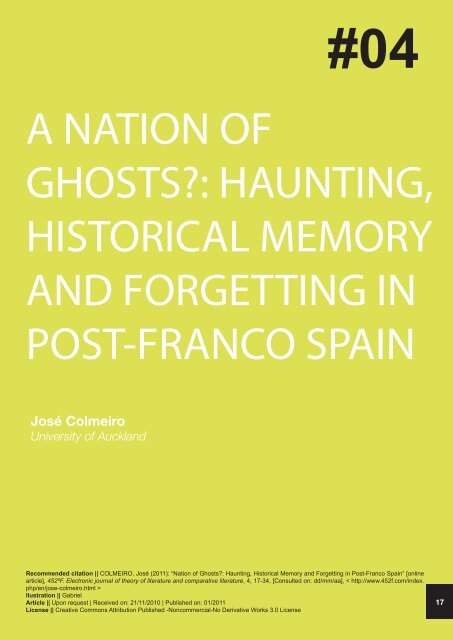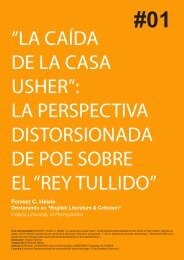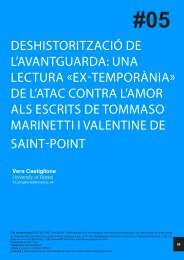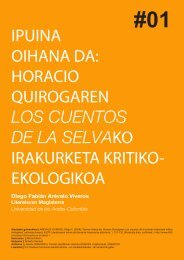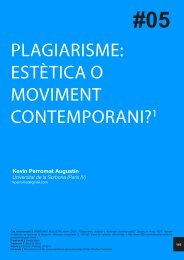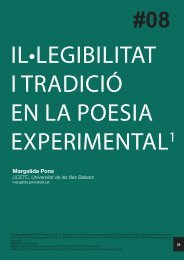a nation of ghosts?: haunting, historical memory and ... - 452ºF
a nation of ghosts?: haunting, historical memory and ... - 452ºF
a nation of ghosts?: haunting, historical memory and ... - 452ºF
Create successful ePaper yourself
Turn your PDF publications into a flip-book with our unique Google optimized e-Paper software.
A NATION OF<br />
#04<br />
GHOSTS?: HAUNTING,<br />
HISTORICAL MEMORY<br />
AND FORGETTING IN<br />
POST-FRANCO SPAIN<br />
José Colmeiro<br />
University <strong>of</strong> Auckl<strong>and</strong><br />
Recommended citation || COLMEIRO, José (2011): “Nation <strong>of</strong> Ghosts?: Haunting, Historical Memory <strong>and</strong> Forgetting in Post-Franco Spain” [online<br />
article], <strong>452ºF</strong>. Electronic journal <strong>of</strong> theory <strong>of</strong> literature <strong>and</strong> comparative literature, 4, 17-34, [Consulted on: dd/mm/aa], < http://www.452f.com/index.<br />
php/en/jose-colmeiro.html ><br />
Ilustration || Gabriel<br />
Article || Upon request | Received on: 21/11/2010 | Published on: 01/2011<br />
License || Creative Commons Attribution Published -Noncommercial-No Derivative Works 3.0 License<br />
17
<strong>452ºF</strong><br />
Abstract || This essay examines some <strong>of</strong> the critical <strong>and</strong> theoretical approaches in the area <strong>of</strong><br />
<strong>historical</strong> <strong>memory</strong> <strong>and</strong> identity studies that have emerged as a response to the contemporary<br />
cultural challenges that have resulted from the social <strong>and</strong> political transformations which have<br />
taken place globally in the last decades. The essay narrows its focus to a case study <strong>of</strong> the role <strong>of</strong><br />
<strong>historical</strong> <strong>memory</strong> in the formation <strong>of</strong> collective identities in contemporary Spain, in the aftermath<br />
<strong>of</strong> the dictatorship <strong>and</strong> the subsequent political transition. This study explores in particular the<br />
use <strong>of</strong> the trope <strong>of</strong> <strong>haunting</strong> <strong>ghosts</strong> in contemporary Spanish literature <strong>and</strong> cinema as symtomatic<br />
form <strong>of</strong> spectrality <strong>of</strong> the repressed collective past.<br />
Key-words || Transition | Historical <strong>memory</strong> | Ghosts | Spain.<br />
18
“The past is never dead. In fact, it’s not even past.”<br />
William Faulkner<br />
Requiem for a Nun<br />
“El olvido es una de las formas de la memoria”<br />
Jorge Luis Borges<br />
0. Memory <strong>and</strong> Identity: Some comparative theoretical<br />
perspectives<br />
The study <strong>of</strong> <strong>memory</strong> <strong>and</strong> collective identity formation has become<br />
a major area <strong>of</strong> academic research in our days, cutting across the<br />
boundaries <strong>of</strong> long established disciplines in Social Sciences <strong>and</strong><br />
Arts <strong>and</strong> Letters. Narratives <strong>of</strong> <strong>memory</strong> <strong>and</strong> collective identity, <strong>and</strong> the<br />
academic discourses that examine them <strong>and</strong> construct them, have<br />
experienced enormous growth in recent years, <strong>and</strong> no discipline in<br />
the Humanities, whether cultural anthropology, literature, cinema,<br />
history or political science, has been impervious to its advance. As<br />
interdisciplinarity, with the advent <strong>of</strong> cultural studies, is fast becoming<br />
the norm rather than the exception in the dominant Anglo academic<br />
world, <strong>and</strong> gaining greater visibility everywhere, traditional boundaries<br />
are being redrawn, <strong>and</strong> the constitution <strong>of</strong> discreet fields <strong>of</strong> knowledge<br />
is undergoing an extensive transformation. Perhaps arguably, some<br />
<strong>of</strong> the most innovative leading-edge research in the Humanities is<br />
currently taking place at the intersections <strong>and</strong> margins <strong>of</strong> traditional<br />
disciplines <strong>and</strong> canons. The field <strong>of</strong> Comparative Literature, founded<br />
on the principles <strong>of</strong> interdisciplinarity <strong>and</strong> the cross<strong>nation</strong>al study <strong>of</strong><br />
literatures, is potentially well situated to pr<strong>of</strong>it from this paradigmatic<br />
shift, but is also subject to radical reconfiguration, as the traditional<br />
theoretical certainties that constructed its edifice have been eroded<br />
in recent years (such as eurocentrism, humanism, <strong>and</strong> universalism).<br />
So how are we to explain this unprecedented attention to the study<br />
<strong>of</strong> <strong>memory</strong> <strong>and</strong> identity in our age? What approaches has critical<br />
theory generated to deal with these issues, <strong>and</strong> what are the limits,<br />
possibilities, <strong>and</strong> challenges for cultural studies in general, <strong>and</strong><br />
for literary studies <strong>and</strong> comparative literature in particular? In the<br />
following pages, I will try to delimit some <strong>of</strong> the theoretical questions<br />
that inform the current debates <strong>of</strong> <strong>memory</strong> <strong>and</strong> collective identity,<br />
<strong>and</strong> their implications for the case study <strong>of</strong> contemporary Spain.<br />
Undoubtedly, the changing paradigms in current critical <strong>and</strong> literary<br />
theory have directly influenced the renewed attention to <strong>memory</strong><br />
<strong>and</strong> collective identity studies. Poststructuralist theorizations <strong>of</strong><br />
difference, a central concept in any modern exploration <strong>of</strong> cultural<br />
identity, have radically repositioned the traditional configurations <strong>of</strong><br />
center <strong>and</strong> margins, <strong>and</strong> have questioned the exclusion/inclusion<br />
A Nation <strong>of</strong> Ghosts?: Haunting, Historical Memory <strong>and</strong> Forgetting in Post-Franco Spain - José Colmeiro<br />
<strong>452ºF</strong>. #04 (2011) 17-34.<br />
19
dynamics involved in canon formation, while challenging the<br />
philosophical tenets <strong>of</strong> Western thought (Derrida). These theories<br />
have also provided the intellectual tools for deconstructing pervasive<br />
dichotomies such as present/past, presence/absence, written/oral,<br />
high/low, History/story that have defined traditional representation.<br />
Challenging those established structures <strong>of</strong> power, the poststructuralist<br />
critique <strong>of</strong> academic discourses has refocused the interest towards<br />
alternative configurations on the margins <strong>of</strong> power <strong>and</strong> traditionally<br />
marginalized or excluded stories from underrepresented groups, as<br />
well as their neglected memories <strong>and</strong> collective identities. Similarly,<br />
the recurring postmodern assessment that our contemporary global<br />
culture suffers amnesia, <strong>and</strong> its accompanying rhetoric <strong>of</strong> mourning<br />
<strong>and</strong> obsession with the loss <strong>of</strong> identity, as seen in the pervasive<br />
signs <strong>of</strong> fragmentation, dismemberment, simulacra, fissures <strong>and</strong> the<br />
cultivation <strong>of</strong> nostalgia, has renovated the interest for the recovery<br />
<strong>of</strong> <strong>memory</strong> <strong>and</strong> cultural identity. In a lament over the disappearance<br />
<strong>of</strong> traditional forms <strong>of</strong> <strong>memory</strong> in modern societies, Pierre Nora has<br />
noted that “we speak so much <strong>of</strong> <strong>memory</strong> because there is so little <strong>of</strong> it<br />
left” (7). Andreas Huyssen has expressed eloquently the paradoxical<br />
dynamics <strong>of</strong> <strong>memory</strong> <strong>and</strong> forgetting: “The spread <strong>of</strong> amnesia in our<br />
culture is matched by a relentless fasci<strong>nation</strong> with <strong>memory</strong> <strong>and</strong> the<br />
past” (254).<br />
Likewise, postcolonial theories have questioned metropolitan<br />
hegemony <strong>and</strong> cultural homogeneity, while refocusing the attention<br />
to multiculturalism <strong>and</strong> the construction <strong>of</strong> subaltern identities<br />
(Bhabha, Gayatri Spivak). Feminism <strong>and</strong> queer studies have<br />
provided fundamental theoretical insights into the construction <strong>of</strong><br />
gender <strong>and</strong> sexual identities <strong>and</strong> different process <strong>of</strong> remembrance<br />
(Butler). Diaspora <strong>and</strong> globalization studies have also focused on the<br />
role <strong>of</strong> collective memories in the formation <strong>of</strong> group identities in a<br />
constantly shifting world (Said, Castells, García Canclini). The study<br />
<strong>of</strong> collective <strong>memory</strong> represents an alternative to <strong>of</strong>ficial <strong>nation</strong>al<br />
historiographies, potentially giving voice to the subjects traditionally<br />
excluded from representation, minority <strong>and</strong> subaltern groups, on the<br />
basis <strong>of</strong> cultural contingencies such as ethnicity, language, class,<br />
gender <strong>and</strong> sexuality, among others. In all those areas, reconstructing<br />
the histories <strong>of</strong> those marginalized groups <strong>and</strong> underst<strong>and</strong>ing the<br />
formation <strong>of</strong> collective identities are enterprises that need to be<br />
undertaken h<strong>and</strong> in h<strong>and</strong>.<br />
Memory <strong>and</strong> collective identity have also become intensely debated<br />
topics in social discourses <strong>and</strong> the mass media, as issues <strong>of</strong> cultural<br />
identity have frequently focused on the construction <strong>of</strong> cultural<br />
<strong>and</strong> <strong>historical</strong> memories. This has been particularly the case in the<br />
context <strong>of</strong> post cold war <strong>and</strong> post dictatorship societies in need to<br />
reopen <strong>and</strong> investigate their past, which had been heavy guarded<br />
<strong>and</strong> repressed, <strong>and</strong> the new challenges provoked by the currents<br />
A Nation <strong>of</strong> Ghosts?: Haunting, Historical Memory <strong>and</strong> Forgetting in Post-Franco Spain - José Colmeiro<br />
<strong>452ºF</strong>. #04 (2011) 17-34.<br />
20
<strong>of</strong> globalization (Barahona De Brito et al. 2001; Waisman <strong>and</strong> Rein<br />
2005; Martín-Estudillo <strong>and</strong> Roberto Ampuero 2008).<br />
The apparent paradox <strong>of</strong> the current “obsession with <strong>memory</strong>”<br />
(Huyssen) in our forgetful contemporary societies needs to be put<br />
in the same context <strong>of</strong> the paradigmatic shifts in cultural studies<br />
mentioned above, <strong>and</strong> the ensuing double paradox <strong>of</strong> the centrality <strong>of</strong><br />
marginality <strong>and</strong> the role <strong>of</strong> cultural difference in identity formation. My<br />
hypothesis is that these phenomena are a reflection <strong>of</strong> the enormous<br />
social <strong>and</strong> <strong>historical</strong> changes that have occurred globally in the last<br />
decades <strong>of</strong> the 20th century, <strong>and</strong> the cultural anxieties generated by<br />
the unleashing <strong>of</strong> the currents <strong>of</strong> globalization <strong>and</strong> the resulting fear<br />
<strong>of</strong> collective forgetting.<br />
Several theories <strong>of</strong> <strong>memory</strong> have become particularly useful for the<br />
study <strong>of</strong> collective identity in cultural studies. It is worth remembering<br />
two important aspects <strong>of</strong> Maurice Halbwachs’s classic theory <strong>of</strong><br />
collective <strong>memory</strong>, which, quite fittingly coming from a sociologist,<br />
privileged the social dimension <strong>of</strong> remembrance. On the one h<strong>and</strong>,<br />
his conceptualization <strong>of</strong> <strong>memory</strong> as a social construction, with his<br />
tenet that “individuals always use social frameworks when they<br />
remember” (40). On the other, his notion that the <strong>memory</strong> <strong>of</strong> the<br />
past is a reconstruction, more than a recovery, reenacted from the<br />
present <strong>and</strong> always informed by that present: “Even at the moment<br />
<strong>of</strong> reproducing the past our imagi<strong>nation</strong> remains under the influence<br />
<strong>of</strong> the present social milieu” (49). The past is recovered from the<br />
present, but it is not simply past, since the process <strong>of</strong> recovery <strong>of</strong><br />
the past can have direct <strong>and</strong> indirect repercussions for actions in<br />
the present. Indeed, what we refer to as collective <strong>memory</strong>, many<br />
times is a present collective consciousness <strong>of</strong> the past, rather than<br />
personally lived memories. Thus for Silvia Molloy, <strong>historical</strong> <strong>memory</strong><br />
is “una base de saberes fragmentarios compartidos por un grupo”<br />
(257). More recently, the study <strong>of</strong> collective <strong>memory</strong> in cultural <strong>and</strong><br />
literary studies has been energized by the work <strong>of</strong> historian Pierre<br />
Nora <strong>and</strong> his influential theory <strong>of</strong> lieux de mémoire, as material,<br />
symbolic, <strong>and</strong> functional “sites <strong>of</strong> <strong>memory</strong>”. According to Nora, in our<br />
modern societies characterized by the prevalence <strong>of</strong> mass culture on<br />
a global scale, <strong>memory</strong> has ceased to have the traditional channels<br />
<strong>and</strong> functions <strong>of</strong> premodern societies, in part because it has been<br />
replaced by history. Instead, Nora acknowledges “the embodiment <strong>of</strong><br />
<strong>memory</strong> in certain sites where a sense <strong>of</strong> <strong>historical</strong> continuity persists”<br />
(Nora 7). These new spaces <strong>of</strong> remembrance are lieux de mémoire,<br />
defined by Davis <strong>and</strong> Starn as “‘places’ where memories converge,<br />
condense, conflict, <strong>and</strong> define relationships between past, present,<br />
<strong>and</strong> future” (Davis 3). Monuments, museums, commemorations,<br />
symbols, books, documentaries, all can be considered collective<br />
“sites <strong>of</strong> <strong>memory</strong>”, <strong>and</strong> the meanings taking shape in those sites<br />
have potential impact in the formation <strong>and</strong> consolidation <strong>of</strong> modern<br />
A Nation <strong>of</strong> Ghosts?: Haunting, Historical Memory <strong>and</strong> Forgetting in Post-Franco Spain - José Colmeiro<br />
<strong>452ºF</strong>. #04 (2011) 17-34.<br />
21
collective identities.<br />
Within poststructuralist <strong>and</strong> postcolonial cultural studies there has<br />
developed a critique <strong>of</strong> the traditional emphasis on the recovery<br />
<strong>of</strong> the past, as the essential element <strong>of</strong> collective identity. While<br />
recognizing the absolute importance that the gaps in the narratives<br />
<strong>of</strong> the past be acknowledged, <strong>and</strong> silences be articulated, there has<br />
been a refocusing from simple recovery to questioning what we do<br />
collectively with that past, <strong>and</strong> how we try to deal, or not, with it. For<br />
cultural theorist Stuart Hall, from a postcolonial identity perspective,<br />
the crucial point involves more than the actual recovery or discovery<br />
the past, focusing more on how that process is undertaken, <strong>and</strong> how<br />
those narratives are retold for the interest <strong>of</strong> the present (<strong>and</strong> future).<br />
He suggests that cultural practices <strong>and</strong> narratives <strong>of</strong> identity such as<br />
literature or cinema go beyond: “not the rediscovery but the production<br />
<strong>of</strong> identity. Not an identity grounded in the archaeology, but in the retelling<br />
<strong>of</strong> the past” (224). The interest lies in the actual process <strong>of</strong><br />
reconstruction <strong>of</strong> the past, <strong>and</strong> the ensuing construction <strong>of</strong> collective<br />
identities. More than simply identity understood as “being”, which is a<br />
basic <strong>and</strong> necessary sense <strong>of</strong> identity, he aims for a cultural identity<br />
as the process <strong>of</strong> “becoming”, thus challenging any preconstructed<br />
or received notions <strong>of</strong> identity. Just like memories by definition are<br />
not stable or fixed, but always in a process <strong>of</strong> reconstruction, so<br />
are cultural identities, occurring in a <strong>historical</strong> frame, <strong>and</strong> always<br />
evolving. Thus, Hall’s concept <strong>of</strong> cultural identity “is not a fixed<br />
essence at all, lying unchanged outside history <strong>and</strong> culture. It is not<br />
some universal <strong>and</strong> transcendental spirit inside us on which history<br />
has made no fundamental mark. It is not once-<strong>and</strong>-for-all. It is not a<br />
fixed origin to which we can make some final <strong>and</strong> absolute Return”<br />
(226). Hall recognizes the dangers inherent in any cultural practice<br />
that essentializes the past, as the mythical point <strong>of</strong> origin <strong>and</strong> return,<br />
<strong>and</strong> its fetishization <strong>of</strong> the past, instead underlining the effect <strong>of</strong> our<br />
contextual cultural positionality in regards to that past:<br />
Cultural identities come from somewhere, have histories. But like<br />
everything which is <strong>historical</strong>, they undergo constant transformation. Far<br />
from being eternally fixed in some essentialised past, they are subject<br />
to the continuous ‘play’ <strong>of</strong> history, culture <strong>and</strong> power. Far from being<br />
grounded in mere ‘recovery’ <strong>of</strong> the past, which is waiting to be found,<br />
<strong>and</strong> which when found, will secure our sense <strong>of</strong> ourselves into eternity,<br />
identities are the names we give to the different ways we are positioned<br />
by, <strong>and</strong> position ourselves within, the narratives <strong>of</strong> the past. (225).<br />
Other contemporary critics have also noted how collective <strong>memory</strong><br />
<strong>and</strong> identity are mutually supportive cultural constructions following<br />
a continuous process <strong>of</strong> selectively forgetting <strong>and</strong> remembering.<br />
Under this light, the constructions <strong>of</strong> <strong>memory</strong> <strong>and</strong> collective identity<br />
have to be seen side by side. On a special issue <strong>of</strong> Representations<br />
on Memory <strong>and</strong> History, Davis <strong>and</strong> Starn have noted: “We can say<br />
A Nation <strong>of</strong> Ghosts?: Haunting, Historical Memory <strong>and</strong> Forgetting in Post-Franco Spain - José Colmeiro<br />
<strong>452ºF</strong>. #04 (2011) 17-34.<br />
22
… that identity depends on <strong>memory</strong>, whether we mean by that a<br />
core self that remembers its earlier states or, poststructurally, the<br />
narratives that construct (<strong>and</strong> deconstruct) identities by comparing<br />
‘once upon a time’ <strong>and</strong> ‘here <strong>and</strong> now’” (4). Memory st<strong>and</strong>s as the<br />
founding block <strong>of</strong> collective identity, as Andreas Huyssen as noted:<br />
“Without <strong>memory</strong>, without reading the traces <strong>of</strong> the past, there can be<br />
no recognition <strong>of</strong> difference (…), no tolerance for the rich complexities<br />
<strong>and</strong> instabilities <strong>of</strong> personal, cultural, political <strong>and</strong> <strong>nation</strong>al identities”<br />
(252). Memory forms the basis for a sense <strong>of</strong> cultural collective<br />
identity marked by those contingencies <strong>of</strong> difference such as class,<br />
gender, language <strong>and</strong> ethnicity. The construction <strong>of</strong> <strong>nation</strong>al identities<br />
is directly shaped by the recollection <strong>of</strong> collective memories <strong>of</strong> a<br />
common past. As such, <strong>memory</strong> has an important function as a site<br />
<strong>of</strong> struggle <strong>and</strong> resistance for oppressed groups (ethnic <strong>and</strong> linguistic<br />
minorities, political dissidents, women, exiles, migrants, etc.) in their<br />
construction <strong>of</strong> alternative cultural identities, against <strong>of</strong>ficial narratives<br />
<strong>of</strong> the past that has excluded them. These cultural contingencies<br />
can, <strong>and</strong> <strong>of</strong>ten do, cross the geopolitical <strong>nation</strong>al boundaries, <strong>and</strong><br />
therefore trans<strong>nation</strong>al communities are formed. In addition, the new<br />
forces <strong>of</strong> globalization <strong>and</strong> the transformation <strong>of</strong> trans<strong>nation</strong>al public<br />
spheres are also influencing the existing channels <strong>of</strong> remembrance,<br />
<strong>and</strong> the constitution <strong>of</strong> collective identities that do not coincide with<br />
the <strong>nation</strong>-state (Assmann <strong>and</strong> Conrad).<br />
1. Reconstructing memories <strong>and</strong> identities in modern<br />
Spain<br />
En el fondo el olvido es un gran simulacro<br />
nadie sabe ni puede/ aunque quiera/ olvidar<br />
un gran simulacro repleto de fantasmas<br />
Mario Benedetti<br />
El olvido está lleno de memoria<br />
Against this general backdrop, I would like to focus on the<br />
interrelationship between the construction <strong>of</strong> <strong>historical</strong> <strong>memory</strong> <strong>and</strong><br />
the constitution <strong>of</strong> collective identities in modern Spain, at both the<br />
<strong>nation</strong>-state <strong>and</strong> sub-state levels, before an exami<strong>nation</strong> <strong>of</strong> cultural<br />
representations in literature <strong>and</strong> film. The politics <strong>of</strong> <strong>memory</strong> (in its<br />
diverse manifestations as mourning, nostalgia, counter-<strong>memory</strong>, <strong>and</strong><br />
forgetting) has become a site <strong>of</strong> struggle for cultural definition in Spain<br />
in the long period from dictatorship to democracy, <strong>and</strong> the construction<br />
<strong>of</strong> <strong>memory</strong> has played a key role in the subsequent process <strong>of</strong><br />
political <strong>and</strong> cultural decentralization in post-Franco Spain. In this<br />
context, it is crucial to examine how the process <strong>of</strong> identity definition<br />
constructs, <strong>and</strong> is constructed by, <strong>historical</strong> <strong>memory</strong>. This issue is<br />
particularly relevant in our day as Spain’s modern transformation<br />
A Nation <strong>of</strong> Ghosts?: Haunting, Historical Memory <strong>and</strong> Forgetting in Post-Franco Spain - José Colmeiro<br />
<strong>452ºF</strong>. #04 (2011) 17-34.<br />
23
<strong>and</strong> recognition <strong>of</strong> its plurilingual <strong>and</strong> multicultural reality has become<br />
a particular case study for central questions about the formation <strong>of</strong><br />
modern subjectivity <strong>and</strong> the struggle for cultural self-representation<br />
<strong>and</strong> self-definition. These changes have not escaped the attention<br />
<strong>of</strong> other <strong>nation</strong>s <strong>and</strong> communities struggling to affirm their cultural<br />
identities, particular <strong>nation</strong>al minorities without a state, such as the<br />
Scottish, Welsh or Flemish, <strong>and</strong> others involved in the process <strong>of</strong><br />
democratic transformation <strong>and</strong> modernization, particularly Latin<br />
America <strong>and</strong> Eastern Europe. It is the case that in our post-<strong>nation</strong>al<br />
global setting, communities learn from each other’s pasts beyond the<br />
limits <strong>of</strong> the <strong>nation</strong>, which traditionally has been the principal channel<br />
<strong>of</strong> collective <strong>memory</strong>.<br />
We can distinguish three particular cultural moments in contemporary<br />
Spain that have shaped the construction <strong>of</strong> <strong>memory</strong> <strong>and</strong> collective<br />
identity: the post civil war dictatorship, the democratic Transition, <strong>and</strong><br />
the post-transition process <strong>of</strong> European integration <strong>and</strong> globalization.<br />
Following the trauma <strong>of</strong> the Spanish civil war (1936-1939) <strong>and</strong> its<br />
long aftermath in the repressive regime <strong>of</strong> General Franco, <strong>memory</strong><br />
became a site <strong>of</strong> ideological struggle. Memories <strong>of</strong> the civil war were<br />
<strong>of</strong>ficially repressed, the war was rewritten as a religious Crusade,<br />
<strong>and</strong> <strong>historical</strong> <strong>memory</strong> was substituted by nostalgia for a long lost<br />
imperial past, when not literally exiled, as hundreds <strong>of</strong> thous<strong>and</strong>s<br />
died, were imprisoned or disappeared in the post-war diaspora.<br />
A unified Spanish <strong>nation</strong>al identity was imposed from above (one<br />
culture, one language, one religion), as different <strong>nation</strong>al identities<br />
from the periphery (Basque, Catalan <strong>and</strong> Galician in particular)<br />
were subjugated, cultural rights suppressed <strong>and</strong> censored by the<br />
state apparatus. Repressed <strong>historical</strong> <strong>memory</strong> formed a vast corpus<br />
<strong>of</strong> oppositional counter-memories as forms <strong>of</strong> cultural resistance<br />
(particularly in literature, film <strong>and</strong> popular song) many <strong>of</strong> them<br />
produced cl<strong>and</strong>estinely or from exile.<br />
The political Transition from dictatorship to democracy in the 1970s<br />
<strong>and</strong> early 1980s fluctuated between the attempts to recuperate<br />
<strong>historical</strong> <strong>memory</strong> <strong>and</strong> the <strong>of</strong>ficial politics <strong>of</strong> amnesia. The process<br />
<strong>of</strong> democratization, with the recuperation <strong>of</strong> freedom, the recovery <strong>of</strong><br />
vernacular marks <strong>of</strong> identity, <strong>and</strong> the un<strong>of</strong>ficial restoration <strong>of</strong> repressed<br />
memories <strong>of</strong> the <strong>nation</strong>al past, as evidenced in an avalanche<br />
<strong>of</strong> memoirs, autobiographical novels, films, documentaries, <strong>and</strong><br />
revisionist <strong>historical</strong> accounts, paradoxically coincides with the<br />
<strong>of</strong>ficial politics <strong>of</strong> collective forgetting. The new project <strong>of</strong> modernity<br />
dem<strong>and</strong>ed the exorcism <strong>of</strong> the past. The <strong>historical</strong>ly unprecedented<br />
transformation <strong>of</strong> the Spanish political system, characterized by a<br />
consensual multi-party transition, rather than by revolution, coup<br />
or war, was predicated upon the “social contract” <strong>of</strong> the burial <strong>of</strong><br />
the past--no reopening <strong>of</strong> old wounds <strong>and</strong> no questions asked.<br />
Fundamentally, this political transformation followed the model <strong>of</strong> the<br />
A Nation <strong>of</strong> Ghosts?: Haunting, Historical Memory <strong>and</strong> Forgetting in Post-Franco Spain - José Colmeiro<br />
<strong>452ºF</strong>. #04 (2011) 17-34.<br />
24
“transition as a transaction” between political elites. This negotiated<br />
burial <strong>of</strong> the past implicated that political amnesty was thus predicated<br />
upon <strong>historical</strong> amnesia. As a result, the memories <strong>of</strong> the civil war<br />
<strong>and</strong> <strong>of</strong> Franco’s legacy became a new cultural taboo, <strong>and</strong> therefore<br />
acquired the spectral quality <strong>of</strong> <strong>ghosts</strong>, nor here nor there. National<br />
identity became tainted with self-questioning <strong>and</strong> a general sense <strong>of</strong><br />
disorientation. Simultaneously, the <strong>of</strong>ficial silencing <strong>and</strong> forgetting<br />
<strong>of</strong> the <strong>nation</strong>al past came with the affirmation <strong>of</strong> other sub-state<br />
identities, h<strong>and</strong> in h<strong>and</strong> with the reconstruction <strong>of</strong> their particular<br />
collective memories. The shortcomings <strong>of</strong> the transition <strong>and</strong> the<br />
resulting political malaise generated a sense <strong>of</strong> cultural desencanto,<br />
particularly with the anti-Franco sectors <strong>of</strong> the population, marked by<br />
the disillusion with the pragmatic transactional aspect <strong>of</strong> the transition<br />
<strong>and</strong> the general dissolution <strong>of</strong> collective hopes <strong>of</strong> the past <strong>and</strong> the<br />
former unity <strong>of</strong> the anti-Franco resistance. Memory eventually came<br />
to occupy a residual space with a sense <strong>of</strong> nostalgia for a utopian<br />
future indefinitely postponed.<br />
In spite <strong>of</strong> the gr<strong>and</strong> narrative <strong>of</strong> the Spanish transition as an<br />
overwhelming success story, which in fact has become a foundational<br />
myth <strong>of</strong> Spanish modernity 1 , there are some limitations inherent<br />
to the process <strong>of</strong> Spanish democracy which cultural critics <strong>and</strong><br />
historians have noted in hindsight, in particular the way <strong>of</strong> dealing<br />
with the past, or perhaps, <strong>of</strong> not dealing with it 2 . The politics <strong>of</strong><br />
<strong>memory</strong> <strong>of</strong> the transition has been repeatedly described as the<br />
erasure <strong>and</strong> eradication <strong>of</strong> <strong>historical</strong> <strong>memory</strong>, <strong>and</strong> the forgetting<br />
<strong>and</strong> silencing <strong>of</strong> the past (Morán 1991, Medina 2001, Colmeiro<br />
2005, Labanyi 2007). While that perception is based on the <strong>of</strong>ficial<br />
“pact <strong>of</strong> forgetting” brokered by the political elites <strong>and</strong> is in general<br />
terms accurate, I would like to raise a few points for consideration<br />
<strong>of</strong> the role <strong>of</strong> <strong>memory</strong> during the Transition. One is that we should<br />
take into account the asymmetry <strong>of</strong> memories across the <strong>nation</strong>al<br />
geography. The atrophy <strong>of</strong> <strong>memory</strong> in the <strong>nation</strong>al political discourse<br />
was parallel to the recovery <strong>of</strong> <strong>historical</strong> <strong>memory</strong> in the peripheries<br />
<strong>of</strong> the <strong>nation</strong>-estate, where local forms <strong>of</strong> sub-state <strong>nation</strong>alism<br />
relied heavily on a different collective <strong>memory</strong>. A major component<br />
<strong>of</strong> the recognition <strong>of</strong> cultural <strong>and</strong> ethnical difference <strong>of</strong> the so called<br />
“<strong>historical</strong> <strong>nation</strong>alities” <strong>and</strong> their dem<strong>and</strong>s for political rights was<br />
<strong>historical</strong> <strong>memory</strong>. The emphasis however was not in reparations or<br />
backward-looking justice, but in the restoration <strong>of</strong> pre- civil war local<br />
institutions <strong>of</strong> government, <strong>and</strong> Statues <strong>of</strong> Autonomy for Catalonia,<br />
Basque Country <strong>and</strong> Galicia, which had been cut short by Franco’s<br />
uprising against the Republic.<br />
The second point is that <strong>memory</strong> <strong>and</strong> forgetting are not a simple<br />
either-or phenomenon, since <strong>memory</strong> always necessarily involves<br />
forgetting, <strong>and</strong> “forgetting is full <strong>of</strong> <strong>memory</strong>”, as the Uruguayan poet<br />
Mario Benedetti has expressively stated (El olvido está lleno de<br />
NOTES<br />
1 | The Spanish Pavilion at the<br />
2010 World Expo in Shanghai<br />
celebrates spectacularly<br />
the narrative <strong>of</strong> Spanish<br />
modernization as a result <strong>of</strong><br />
the Transition, considered “el<br />
gran éxito de España” by the<br />
Spanish commissioner María<br />
Tena (Reinoso 2010).<br />
2 | “La Transición” has become<br />
a gr<strong>and</strong> narrative in Lyotard’s<br />
sense. Cultural critics have<br />
recently questioned the<br />
unexamined assumption <strong>of</strong><br />
the Spanish Transition as a<br />
“model” referring to its lack<br />
<strong>of</strong> closure in dealing with the<br />
past as well as its symbolic<br />
deficit (see Martín-Estudillo <strong>and</strong><br />
Ampuero 2008).<br />
A Nation <strong>of</strong> Ghosts?: Haunting, Historical Memory <strong>and</strong> Forgetting in Post-Franco Spain - José Colmeiro<br />
<strong>452ºF</strong>. #04 (2011) 17-34.<br />
25
memoria 1995). As a corollary <strong>of</strong> that, I would argue that <strong>historical</strong><br />
<strong>memory</strong> did not complete evaporate during the Transition; it may<br />
have disappeared from the surface <strong>of</strong> political debates but it left<br />
noticeable “traces” <strong>and</strong> remained operative in other areas on the<br />
margins <strong>of</strong> power. Memory was exiled from institutional political<br />
discourse, <strong>and</strong> displaced to the intellectual <strong>and</strong> cultural arena, where<br />
it found a distinctive space, or better a variety <strong>of</strong> lieux de mémoire, as<br />
attested by the sudden increase in the early years <strong>of</strong> the transition,<br />
between 1976 <strong>and</strong> 1978, <strong>of</strong> works <strong>of</strong> literature, documentaries <strong>and</strong><br />
films, <strong>and</strong> <strong>historical</strong> <strong>and</strong> testimonial accounts dealing with the recent<br />
past, <strong>and</strong> the wide public recognition <strong>of</strong> those works. A brief review<br />
<strong>of</strong> popular titles <strong>of</strong> those years would give us a good indication to the<br />
extent that <strong>historical</strong> <strong>memory</strong> was an important matter for the <strong>nation</strong>al<br />
collective imaginary. Award-winning novels such as Los mares del<br />
Sur by Manuel Vázquez Montalbán, El cuarto de atrás by Carmen<br />
Martín Gaite, Si te dicen que caí <strong>and</strong> La muchacha de las bragas<br />
de oro by Juan Marsé, Autobiografía de Federico Sánchez by Jorge<br />
Semprún, testimonios such as Los topos by Manuel Leguineche <strong>and</strong><br />
Jesús Torbado, plays such as Las bicicletas son para el verano by<br />
Fern<strong>and</strong>o Fernán Gómez, <strong>and</strong> documentary films such as Basilio<br />
Martín Patino’s Canciones para después de una guerra <strong>and</strong> Caudillo,<br />
Jaume Camino’s La vieja memoria, Jaime Chavarri’s El desencanto,<br />
among many others. All these works had in common the central<br />
place given to the memories <strong>of</strong> the civil war <strong>and</strong> the dictatorship, <strong>and</strong><br />
their legacy in the present. The fact that most <strong>of</strong> these works became<br />
popular best-sellers <strong>and</strong> box-<strong>of</strong>fice hits, receiving the most important<br />
literary prizes in Spain, such as the Planeta <strong>and</strong> Anagrama, indicates<br />
that <strong>historical</strong> <strong>memory</strong> still resonated strongly with relatively large<br />
segments <strong>of</strong> the Spanish public, no matter what the political elites<br />
had decided behind closed doors, <strong>and</strong> that a significant <strong>memory</strong> void<br />
still needed to be filled.<br />
That brief explosion <strong>of</strong> collective <strong>memory</strong> in the second half <strong>of</strong> the<br />
1970s, however, did not last very long. In essence, there were no<br />
<strong>of</strong>ficial channels for public remembering <strong>and</strong> not enough collective<br />
desire to remember either 3 . Spanish society embraced the new<br />
liberties <strong>and</strong> the experience <strong>of</strong> modernity without much interest in<br />
remembering the sordid past, on the contrary, it actively tried to<br />
disassociate from this past very rapidly. The generational change<br />
would set <strong>of</strong>f the emergence <strong>of</strong> the Movida <strong>and</strong> its intense live-themoment,<br />
forget-about-the-past attitude, which would be an illustrative<br />
result <strong>of</strong> this phenomenon. It is also not surprising that a key symbolic<br />
figure who reappears forcefully in the cultural narratives <strong>of</strong> the<br />
Transition <strong>and</strong> the Movida years is the transsexual/transvestite, an<br />
ambiguous figure who embodies a past that needs to be forgotten,<br />
<strong>and</strong> a present that is constructed as a series <strong>of</strong> continuous acts <strong>of</strong><br />
performance 4 .<br />
NOTES<br />
3 | Aguilar also mentions<br />
“the overwhelming desire<br />
<strong>of</strong> Spanish society to see a<br />
peaceful <strong>and</strong> gradual change<br />
<strong>and</strong> even to pretend that it had<br />
forgotten the past rather than<br />
call anyone to account” (2001,<br />
99).<br />
4 | The marginal figure <strong>of</strong> the<br />
transvestite becomes a symbol<br />
<strong>of</strong> the Spanish transition <strong>and</strong><br />
the pact <strong>of</strong> forgetting with such<br />
iconic stars as Bibi Andersen<br />
<strong>and</strong> Angel Pavlovsky, <strong>and</strong> as<br />
seen in documentaries <strong>and</strong><br />
feature films <strong>of</strong> those years:<br />
Ocaña, Retrat Intermitent<br />
(1978), Cambio de sexo (1977)<br />
o Un hombre llamado Flor<br />
de Otoño (1978). Vázquez<br />
Montalbán recurs to the<br />
transvestite in El pianista<br />
(1985), as a political <strong>and</strong><br />
moral allegory <strong>of</strong> the ambiguity<br />
<strong>of</strong> the transitional period<br />
<strong>and</strong> a critique <strong>of</strong> the cultural<br />
forgetting <strong>of</strong> the past. In the<br />
cultural prodution associated<br />
with la Movida the transvestite<br />
<strong>and</strong> the transexual are also<br />
predominant, such as the<br />
comic Anarcoma by Nazario,<br />
Antón Reixa’s As ladillas do<br />
travesti (1979), <strong>and</strong> <strong>of</strong> course,<br />
the cinema, texts <strong>and</strong> drag<br />
spectacles by Pedro Almodóvar<br />
(La ley del deseo, Patty<br />
Diphusa, Fabio y Macnamara).<br />
A Nation <strong>of</strong> Ghosts?: Haunting, Historical Memory <strong>and</strong> Forgetting in Post-Franco Spain - José Colmeiro<br />
<strong>452ºF</strong>. #04 (2011) 17-34.<br />
26
The crisis <strong>of</strong> <strong>memory</strong> <strong>of</strong> the post-transition <strong>and</strong> the age <strong>of</strong> globalization<br />
has followed a quantitative inflation/qualitative devaluation paradigm,<br />
as the void left by the disenchantment <strong>and</strong> the taboo <strong>of</strong> <strong>memory</strong> has<br />
been filled with new forms <strong>of</strong> <strong>memory</strong> that simultaneously overfill<br />
<strong>and</strong> weaken the traditional channels <strong>of</strong> <strong>memory</strong>: the fragmentation<br />
<strong>and</strong> decentralization <strong>of</strong> <strong>memory</strong> due to the emergence <strong>of</strong> particular<br />
<strong>nation</strong>alist memories <strong>and</strong> new invented traditions (as a reaction<br />
against the absolutist <strong>nation</strong>alism imposed by Franco) <strong>and</strong> in<br />
opposition to a diluted unified <strong>nation</strong>al <strong>memory</strong>; the emergence <strong>of</strong><br />
new forms <strong>of</strong> institutional memorialization filling the void, through the<br />
spectacle, the commemoration <strong>and</strong> the museum; <strong>and</strong> the substitution<br />
<strong>of</strong> <strong>historical</strong> <strong>memory</strong> by a consumption culture <strong>of</strong> nostalgia. This<br />
proliferation <strong>of</strong> institutional <strong>and</strong> commercialized <strong>memory</strong> is in fact<br />
the other side <strong>of</strong> cultural amnesia. As Huyssen as noted, “Amnesia<br />
simultaneously generates its own opposite: the new museum culture<br />
as a reaction formation” (254) 5 .<br />
But, at the same time, we live in a postmodern era without clear<br />
<strong>and</strong> unambiguous overarching gr<strong>and</strong> narratives that tell us what is<br />
important to remember collectively (such as could be, in different times,<br />
the <strong>nation</strong>-state, the revolution, the war, the resistance, <strong>and</strong> so on). In<br />
this context, <strong>nation</strong>al identity is constantly interrogated, fragmented,<br />
deconstructed <strong>and</strong> reconstructed, subject to the opposing challenges<br />
produced by the local/global interface, the processes <strong>of</strong> European<br />
political integration <strong>and</strong> <strong>of</strong> economic <strong>and</strong> cultural globalization,<br />
frequently perceived as threats to vernacular cultural identity. We are<br />
confronting a complex “post-<strong>nation</strong>al” paradigm, in which the crisis <strong>of</strong><br />
the <strong>nation</strong>al is the result <strong>of</strong> challenges from both sub-state forms <strong>of</strong><br />
peripheral <strong>nation</strong>alism (such as Catalan/Basque/Galician, etc), <strong>and</strong><br />
trans<strong>nation</strong>al global currents (such as the European Union). Memory<br />
then becomes a site <strong>of</strong> struggle where collective identities are formed<br />
in reaction to, <strong>and</strong> as a result <strong>of</strong>, these multiple challenges from within<br />
<strong>and</strong> from without.<br />
2. The <strong>haunting</strong> <strong>of</strong> the past in contemporary Spanish<br />
cinema <strong>and</strong> literature<br />
¿Qué es un fantasma? Un evento terrible, condenado a repetirse una<br />
y otra vez. Un instante de dolor, quizá. Algo muerto que parece por<br />
momentos vivo aún. Un sentimiento suspendido en el tiempo. Como<br />
una fotografía borrosa, como un insecto atrapado en ámbar.<br />
Guillermo del Toro<br />
El espinazo del diablo<br />
Undoubtedly there has been a resurgence <strong>of</strong> public interest in<br />
<strong>memory</strong> in Spain in recent years, after several decades <strong>of</strong> diagnosed<br />
NOTES<br />
5 | Natalie Zemon has referred<br />
to a “modern crisis <strong>of</strong> <strong>memory</strong>”<br />
in the generation following the<br />
French Revolution (3).<br />
A Nation <strong>of</strong> Ghosts?: Haunting, Historical Memory <strong>and</strong> Forgetting in Post-Franco Spain - José Colmeiro<br />
<strong>452ºF</strong>. #04 (2011) 17-34.<br />
27
“collective amnesia”. This reawakening has been a result <strong>of</strong> social,<br />
judicial, <strong>and</strong> political movements reclaiming the unearthing, literarily<br />
<strong>and</strong> symbolically, <strong>of</strong> the past (the atrocities <strong>and</strong> human right violations<br />
committed during the Civil War <strong>and</strong> its aftermath). The recent polemic<br />
surrounding the excavation <strong>of</strong> mass graves <strong>of</strong> the Spanish civil war<br />
<strong>and</strong> the dictatorship, <strong>and</strong> the creation <strong>of</strong> a myriad <strong>of</strong> grassroots<br />
organizations such as the Asociación para la Recuperación de la<br />
Memoria Histórica speaks forcefully about the spectral nature <strong>of</strong><br />
Spanish history. Thous<strong>and</strong>s <strong>of</strong> unmarked burial sites in ditches along<br />
the roads still remain in the Spanish l<strong>and</strong>scape, invisible but ever<br />
present, just like <strong>ghosts</strong> still awaiting their day <strong>of</strong> justice. The liminal<br />
<strong>and</strong> invisible position is an adequate metaphor <strong>of</strong> their non-existing<br />
status in the margins <strong>of</strong> the <strong>of</strong>ficial history. Thanks to the work <strong>of</strong><br />
grassroots movements, human right organizations <strong>and</strong> NGOs, they<br />
have become collective lieux de mémoire, highly symbolic sites <strong>of</strong><br />
<strong>memory</strong>. Quite unexpectedly, <strong>memory</strong> has now come back to the<br />
center stage in discussions about what to do collectively with that<br />
past, with crucial political, legal <strong>and</strong> ethical repercussions. There are<br />
also important inter<strong>nation</strong>al issues at stake, with worldwide debates<br />
about the process <strong>of</strong> dealing with the traumatic memories <strong>of</strong> the past,<br />
<strong>and</strong> the extent that amnesty laws can be upheld for crimes against<br />
humanity under the principles <strong>of</strong> universal jurisdiction.<br />
There has been also a simultaneous boom <strong>of</strong> narratives dealing with<br />
the past, in both Spanish literature <strong>and</strong> cinema. Best-selling novels<br />
such as Javier Cercas’s Soldados de Salamina Manuel Rivas’s La<br />
lengua de las mariposas, or Jesús Ferrero’s Las trece rosas, <strong>and</strong><br />
their respective successful film adaptations, immediately come to<br />
mind. We should not explain this reemergence as a simple derivative<br />
phenomenon or a market-driven fad. It is important to consider how<br />
these cultural narratives provide a certain language <strong>and</strong> tools to<br />
engage with the past <strong>and</strong> position ourselves <strong>historical</strong>ly, indeed to<br />
identify as subjects part <strong>of</strong> a collective. As Stuart Hall has noted,<br />
cinematic <strong>and</strong> literary representation are not to be seen as part <strong>of</strong> “a<br />
second-order mirror held up to reflect what already exists, but as that<br />
form <strong>of</strong> representation which is able to constitute us as new kinds<br />
<strong>of</strong> subjects, <strong>and</strong> thereby enable us to discover places from which to<br />
speak” (236-37). In that sense, we should examine how the collective<br />
<strong>memory</strong> <strong>of</strong> the past has been represented in those narratives, what<br />
points <strong>of</strong> enunciation have been deployed, <strong>and</strong> with what effects to<br />
the collective identity.<br />
It is interesting that the predominant mode <strong>of</strong> Spanish cultural<br />
narratives about the past produced in recent years, particularly in<br />
the mass media <strong>of</strong> television <strong>and</strong> cinema, has followed a traditional<br />
realistic <strong>and</strong> costumbrista naturalistic style. Even the screen<br />
adaptations <strong>of</strong> non-realistic works <strong>of</strong> literature repeatedly recur to<br />
long-established realistic, linear modes <strong>of</strong> representation, <strong>of</strong>ten<br />
A Nation <strong>of</strong> Ghosts?: Haunting, Historical Memory <strong>and</strong> Forgetting in Post-Franco Spain - José Colmeiro<br />
<strong>452ºF</strong>. #04 (2011) 17-34.<br />
28
against the grain <strong>of</strong> the original literary work. This is the case <strong>of</strong> well<br />
known film adaptations such as Tiempo de silencio, !Ay, Carmela!, or<br />
O lápis do carpinteiro, three very recognizable works dealing with the<br />
traumas <strong>of</strong> the past in Spain, from the postwar, the transition, <strong>and</strong> the<br />
globalization period respectively. Recent popularly acclaimed films<br />
dealing with this topic such as Los girasoles ciegos, Las trece rosas,<br />
Silencio roto, Libertarias, or El viaje de Carol, all have the same look<br />
<strong>and</strong> feel <strong>of</strong> conventional heritage drama productions. Some critics<br />
have pointed out that these works, in spite <strong>of</strong> their noble goals <strong>of</strong><br />
making the traumatic past <strong>of</strong> repression <strong>and</strong> resistance accessible<br />
<strong>and</strong> underst<strong>and</strong>able to contemporary Spanish audiences, mostly<br />
without direct access or personal recollection <strong>of</strong> those events,<br />
they have made it perhaps too palatable <strong>and</strong> too comfortable, thus<br />
neutralizing their potential as instruments for social intervention.<br />
These film <strong>and</strong> TV series, dressed in the polished style <strong>of</strong> costume<br />
dramas, can appear to reinforce the idea <strong>of</strong> the pastness <strong>of</strong> the<br />
past, easily accessible but just as easily disconnected from present<br />
day <strong>historical</strong> realities <strong>and</strong> social <strong>and</strong> political concerns 6 . This trend<br />
may suggest a certain aesthetic commoditization <strong>of</strong> the horrors <strong>of</strong><br />
the past, somewhat domesticated for contemporary consumption,<br />
when not a nostalgic reinterpretation <strong>of</strong> the past, such as Fern<strong>and</strong>o<br />
Trueba’s Academy-winner Belle Epoque. In some extreme cases,<br />
these representations are literally costume melodramas featuring<br />
glamorous TV actors <strong>and</strong> actresses, appealing to a retro aesthetic,<br />
with fancy period dresses <strong>and</strong> décor, as in the popular Spanish<br />
television soap opera Amar en tiempos revueltos, which has been a<br />
leader in television audience rankings in Spain for several seasons.<br />
As the title <strong>of</strong> the series already suggests, the postwar dictatorship<br />
is just a mere melodramatic backdrop for the conventional love<br />
intrigues <strong>and</strong> disputes characteristic <strong>of</strong> the telenovela genre.<br />
The unproblematic transparent mimetic representation <strong>of</strong> the past, with<br />
its meticulously reconstructed mise-en-scene, <strong>and</strong> traditional linear<br />
structure, effectively sutures the discontinuities <strong>of</strong> the fragmented<br />
past, made out <strong>of</strong> silences <strong>and</strong> voids. This tendency to reconstruct<br />
the past as a narrative without fissures <strong>and</strong> safely removed from<br />
present day realities, thus paradoxically seems to replicate the<br />
straight <strong>and</strong> smooth <strong>of</strong>ficial <strong>historical</strong> narratives that avoid challenging<br />
the status quo. Thus, many <strong>of</strong> these sanitized representations <strong>of</strong><br />
the past dangerously follow the <strong>of</strong>ficially sanctioned discourse <strong>of</strong><br />
reconciliation without apologies or reparations, <strong>and</strong> the erasure <strong>of</strong><br />
potentially destabilizing counter-discourses, reinforcing the pastness<br />
<strong>of</strong> the past <strong>and</strong> its irrelevance to present day concerns.<br />
On the other h<strong>and</strong>, some writers <strong>and</strong> directors dealing with the<br />
subject <strong>of</strong> the Spanish civil war <strong>and</strong> the dictatorship have recurred to<br />
other non-realistic modes, in an effort to better capture the work <strong>of</strong><br />
<strong>memory</strong>, the experiences <strong>of</strong> trauma, the silences <strong>and</strong> the voids <strong>of</strong> the<br />
NOTES<br />
6 | Several cultural critics <strong>and</strong><br />
intellectuals have noted the<br />
problematic ramification <strong>of</strong> this<br />
trend (Labanyi, Rosa).<br />
A Nation <strong>of</strong> Ghosts?: Haunting, Historical Memory <strong>and</strong> Forgetting in Post-Franco Spain - José Colmeiro<br />
<strong>452ºF</strong>. #04 (2011) 17-34.<br />
29
past, the <strong>historical</strong> discontinuities, <strong>and</strong> the elusive nature <strong>of</strong> <strong>historical</strong><br />
narrativization. One recurring element used in these works has<br />
been the trope <strong>of</strong> <strong>haunting</strong>, which underlies the ghostly nature <strong>of</strong> the<br />
past in its ever-returning nature, projecting its shadow towards the<br />
present <strong>and</strong> the future. These <strong>haunting</strong> narratives thus make visible<br />
the disappearances <strong>and</strong> absences silenced in normative <strong>historical</strong><br />
accounts, <strong>and</strong> replicate the process <strong>of</strong> confronting a difficult past that<br />
still needs to be dealt with in the present.<br />
Several cultural critics have advanced theories to explain the<br />
recurring presence <strong>of</strong> <strong>ghosts</strong> in contemporary narratives <strong>of</strong> the<br />
past. Some have argued that these <strong>ghosts</strong> reflect the postmodern<br />
disbelief in master narratives <strong>of</strong> progress, that the spectral histories<br />
<strong>of</strong> discontinuities <strong>and</strong> absences are a response to the need <strong>of</strong><br />
creating new accounts <strong>of</strong> the past that do not replicate the <strong>of</strong>ficial<br />
<strong>historical</strong> accounts, acknowledging the victims <strong>of</strong> modernity, those<br />
precisely disappeared from the <strong>historical</strong> record (Marcus). María<br />
do Cebreiro Rábade has referred to this <strong>haunting</strong> aspect as a<br />
defining characteristic <strong>of</strong> <strong>historical</strong>ly dispossessed communities.<br />
In her insightful exami<strong>nation</strong> <strong>of</strong> the “unspeakable home” <strong>of</strong> the<br />
stateless Galician <strong>nation</strong>, she notes that Galician cultural narratives<br />
are <strong>of</strong>ten marked with the overwhelming presence <strong>of</strong> <strong>ghosts</strong>. For<br />
Rábade, Galicia is symbolically represented in those narratives as a<br />
“community <strong>of</strong> the dispossessed” <strong>and</strong> a “<strong>nation</strong> <strong>of</strong> <strong>ghosts</strong>” (Rabade<br />
244). More generally speaking, it can be argued that it is in those<br />
societies that need to confront their own (self) repressed histories<br />
that the spectrality <strong>of</strong> the past is perhaps more noticeable. In<br />
Spanish cultural studies in particular, Jo Labanyi, following Jacques<br />
Derrida’s formulations in Spectres <strong>of</strong> Marx, has presented in a series<br />
<strong>of</strong> articles a suggestive interpretation <strong>of</strong> the recurrence <strong>of</strong> <strong>ghosts</strong><br />
in contemporary Spanish culture. Labanyi bases her analysis on a<br />
reworking <strong>of</strong> Derrida’s concept <strong>of</strong> “hauntology”, a neologism created<br />
in a typical poststructuralist pun as an alternative to ontology, to<br />
describe the spectral aspect <strong>of</strong> history, a past which is already not<br />
there but at the same time makes itself present. The spectrality <strong>of</strong><br />
history requires a process <strong>of</strong> acknowledgement <strong>of</strong> the “traces” <strong>of</strong> the<br />
traumatic past, by allowing the repressed memories <strong>of</strong> the past to<br />
be told in ghost form. The ethical imperative emanating from these<br />
narratives is to give <strong>ghosts</strong> “a hospitable <strong>memory</strong>… out <strong>of</strong> a concern<br />
for justice (qtd Labanyi 2002, 12).<br />
José Sinisterra’s play Ay Carmela, Manuel Rivas’ novel O lápis do<br />
carpinteiro, <strong>and</strong> Guillermo del Toro’s film El espinazo del diablo, among<br />
others, rely centrally on the trope <strong>of</strong> <strong>ghosts</strong>, to tackle the traumatic<br />
legacy <strong>of</strong> the horrors <strong>of</strong> the past in the present. It is intriguing that the<br />
same presence <strong>of</strong> <strong>ghosts</strong> occurs prominently in other inter<strong>nation</strong>ally<br />
acclaimed recent films by Spanish directors, such as Alej<strong>and</strong>ro<br />
Amenábar´s The Others <strong>and</strong> José Luis Bayona´s El orfanato, two <strong>of</strong><br />
A Nation <strong>of</strong> Ghosts?: Haunting, Historical Memory <strong>and</strong> Forgetting in Post-Franco Spain - José Colmeiro<br />
<strong>452ºF</strong>. #04 (2011) 17-34.<br />
30
the greatest inter<strong>nation</strong>al box-<strong>of</strong>fice hits <strong>of</strong> Spanish cinema <strong>of</strong> all time,<br />
with not apparent or obvious <strong>historical</strong> connections to the Spanish<br />
civil war or Franco’s dictatorship. The centrality <strong>of</strong> ghost narratives<br />
in these films <strong>and</strong> the present preoccupation with the resurgence <strong>of</strong><br />
a <strong>nation</strong>al repressed past cannot be mere coincidences. We should<br />
remember that one condition <strong>of</strong> <strong>ghosts</strong> is their elliptical nature, as well<br />
as the fact that they don’t make themselves visible to everybody 7 .<br />
Also, the trope <strong>of</strong> orphanhood, like the trope <strong>of</strong> <strong>ghosts</strong>, has a well<br />
established connection in post civil war Spanish culture, by referring<br />
elliptically to the unspeakable horrors <strong>of</strong> the past <strong>and</strong> the traumatized<br />
identities <strong>of</strong> its victims (Nada, Primera memoria, Cría cuervos, El<br />
desencanto, El Sur, Los niños de Rusia, El espinazo del diablo, just<br />
to name a few). Even Pedro Almodóvar’s recent films Volver <strong>and</strong><br />
La mala educación have a central ghostly component, where the<br />
main characters are haunted by the <strong>ghosts</strong> <strong>of</strong> the past, inevitably<br />
connected to the repressive <strong>nation</strong>al past. In these two cases,<br />
however, we encounter rather simulacra <strong>of</strong> <strong>ghosts</strong>, the disappeared<br />
who fake their return as <strong>ghosts</strong> (Volver), or the living who assume the<br />
personality <strong>of</strong> the deceased (Mala educación). But in either case, the<br />
emphasis is on the <strong>haunting</strong> nature <strong>of</strong> the past accosting the living,<br />
<strong>and</strong> its refusal to disappear. This connection should not be altogether<br />
too surprising, since the spectrality <strong>of</strong> the past <strong>and</strong> the postmodern<br />
recurring use <strong>of</strong> simulacra both refer to a void that needs to be filled<br />
in virtuality 8 .<br />
We can see that Spain’s <strong>historical</strong> trauma is the originating cause<br />
<strong>of</strong> these narratives populated by <strong>ghosts</strong>. The spectral nature <strong>of</strong> that<br />
past, full <strong>of</strong> voids, omissions, <strong>and</strong> disappearances, cannot form a<br />
continuous narrative without distortion. Below the smooth surface <strong>of</strong><br />
<strong>of</strong>ficial accounts <strong>of</strong> history, lie those stories that have been silenced<br />
<strong>and</strong> erased, leaving only their ghostly traces, <strong>and</strong> therefore bound to<br />
return <strong>and</strong> haunt the present. Ghost stories construct a representation<br />
<strong>of</strong> the past “as a <strong>haunting</strong>, rather than a reality immediately accessible<br />
to us” (Labanyi 2007, 112). Ghosts, as embodiment <strong>of</strong> the past in the<br />
present, destabilize the accepted notions <strong>of</strong> history, reality, <strong>and</strong> self,<br />
<strong>and</strong> the clear demarcations that define them. Their here-but-nothere<br />
borderline existence, between the dead <strong>and</strong> the living, blurs the<br />
binary divide that constructs our perception <strong>of</strong> reality. Ghosts remind<br />
us that we need to confront our past if we want to move ahead <strong>and</strong><br />
construct a better future.<br />
It seems evident that the reappearance <strong>of</strong> <strong>ghosts</strong> in Spanish post-<br />
Franco culture has almost everything to do with the repression <strong>of</strong><br />
the past, as an enforced prohibition during the dictatorship, <strong>and</strong><br />
as a political taboo derived from the “pact <strong>of</strong> forgetting” during the<br />
political transition. The return <strong>of</strong> the past in spectral form would be<br />
thus a symptom <strong>of</strong> the collective inability to deal with it properly, but<br />
it can also <strong>of</strong>fer the possibility <strong>of</strong> rectification, acknowledgement <strong>and</strong><br />
NOTES<br />
7 | Natalia Andrés del Pozo<br />
makes a convincing argument<br />
for the <strong>historical</strong> symbolism<br />
<strong>of</strong> <strong>ghosts</strong> in Juan Antonio<br />
Bayona´s El orfanato. Similarly,<br />
Acevedo-Muñoz has analyzed<br />
the <strong>nation</strong>al allegories <strong>of</strong><br />
the traumatic legacies <strong>of</strong> the<br />
repressed past in Alej<strong>and</strong>ro<br />
Amenábar´s Abre los ojos <strong>and</strong><br />
The Others. These films project<br />
the still unresolved questions<br />
<strong>of</strong> the <strong>nation</strong>al past onto the<br />
global scene, which coincides<br />
with the trans<strong>nation</strong>alization<br />
<strong>of</strong> memories <strong>and</strong> policies<br />
dealing with the past <strong>and</strong> the<br />
establishment <strong>of</strong> universal<br />
jurisdiction.<br />
8 | Interestingly, the<br />
Spanishness <strong>of</strong> some <strong>of</strong><br />
these films almost entirely<br />
disappears, as in The Others,<br />
which was shot directly in<br />
English with a complete cast<br />
<strong>of</strong> English actors. Thus not<br />
only the past is spectral, the<br />
very core <strong>of</strong> the movie is built<br />
around a void, an unspeakable<br />
unheimlich place, like the<br />
spaces left empty by thous<strong>and</strong>s<br />
<strong>of</strong> forced disappearances.<br />
A Nation <strong>of</strong> Ghosts?: Haunting, Historical Memory <strong>and</strong> Forgetting in Post-Franco Spain - José Colmeiro<br />
<strong>452ºF</strong>. #04 (2011) 17-34.<br />
31
eparation. The mythical figure <strong>of</strong> Federico García Lorca, a symbolic<br />
<strong>nation</strong>al martyr <strong>of</strong> the Spanish fascist uprising, assassinated in the<br />
first weeks <strong>of</strong> the civil war for his political <strong>and</strong> sexual orientation, <strong>and</strong><br />
still unaccounted for, is pr<strong>of</strong>oundly symbolic. Like a ghost, Lorca’s<br />
shadow is a powerful reminder <strong>of</strong> the unsettled nature <strong>of</strong> the collective<br />
past, still <strong>haunting</strong> the present. In the same manner as the spectral<br />
representations <strong>of</strong> the past in the literary <strong>and</strong> cinematic works seen<br />
before, this shadow projects the image <strong>of</strong> a <strong>nation</strong> full <strong>of</strong> <strong>ghosts</strong>, still<br />
waiting recovery, resolution, <strong>and</strong> reparation.<br />
A Nation <strong>of</strong> Ghosts?: Haunting, Historical Memory <strong>and</strong> Forgetting in Post-Franco Spain - José Colmeiro<br />
<strong>452ºF</strong>. #04 (2011) 17-34.<br />
32
Works cited<br />
ACEVEDO-MUÑOZ, Ernesto R. “Horror <strong>of</strong> Allegory: The Others <strong>and</strong> its Context”<br />
Contemporary Spanish Cinema <strong>and</strong> Genre. Jay Beck <strong>and</strong> Vicente Rodríguez Ortega (eds.).<br />
anchester: Manchester UP, 2008. 202-218.<br />
ANDRÉS DEL POZO, M. Natalia. “Dealing with an Uncomfortable Relative: The Silent Mass<br />
Graves in The Orphanage”, More than Thought (Fall 2010). Web.<br />
morethanthought.community.<strong>of</strong>ficelive.com/MNataliaAndresdelPozo.aspx<br />
ASSMANN, Aleida <strong>and</strong> Sebastian CONRAD (eds.). Memory in a Global Age. Discourses,<br />
Practices <strong>and</strong> Trajectories, Basingstoke: Palgrave Macmillan, 2010.<br />
BHABHA, Homi. The Location <strong>of</strong> Culture. London: Routledge, 1994.<br />
BRITO, Alex<strong>and</strong>ra Barahona De, Carmen GONZÁLEZ ENRIQUEZ <strong>and</strong> Paloma AGUILAR<br />
(eds.), The Politics <strong>of</strong> Memory <strong>and</strong> Democratization. Oxford: Oxford University Press, 2001.<br />
BUTLER, Judith. Gender Trouble. Nueva York, Routledge, 1999.<br />
COLMEIRO, José F. Memoria histórica e identidad cultural: De la postguerra a la<br />
postmodernidad. Barcelona: Anthropos, 2005.<br />
DAVIS, Natalie Zemon <strong>and</strong> R<strong>and</strong>olph STARN, “Introduction.” Representations 26 (1989): 1-6.<br />
DERRIDA, Jacques. Dissemi<strong>nation</strong>. Chicago: University <strong>of</strong> Chicago Press, 1981.<br />
CASTELLS, Manuel. The Information Age: Economy, Society <strong>and</strong> Culture. Vol. 1 The Rise <strong>of</strong><br />
the Network Society. Vol 2. The Power <strong>of</strong> Identity. Vol. 3 End <strong>of</strong> Millenium. Oxford: Blackwell,<br />
1997.<br />
GARCÍA CANCLINI, Néstor. Consumers <strong>and</strong> Citizens: Globalization <strong>and</strong> Multicultural Conflicts.<br />
Minneapolis; University <strong>of</strong> Minnesota Press, 2001.<br />
HALBWACHS, Maurice. On Collective Memory. Chicago: U <strong>of</strong> Chicago Press, 1992.<br />
HALL, Stuart. “Cultural Identity And Diaspora” Rutherford, Johnathan, ed. Identity:Community,<br />
Culture, Difference. London: Lawrence & Wishart, 1990, 222-237.<br />
HUYSSEN, Andreas. Twilight Memories: Marking Time in a Culture <strong>of</strong> Amnesia. New York:<br />
Routledge, 1995.<br />
LABANYI, Jo. “Introduction: Engaging with Ghosts; or, Theorizing Culture in Modern Spain.”<br />
Constructing Identity in Contemporary Spain: Theoretical Debates <strong>and</strong> Cultural Practice.<br />
Oxford: Oxford UP, 2002. 1-14.<br />
LABANYI, Jo. “Memory <strong>and</strong> Modernity in Democratic Spain: The Difficulty <strong>of</strong> Coming to Terms<br />
with the Spanish Civil War.” Poetics Today 28.1 (2007): 89-116.<br />
MARTÍN-ESTUDILLO, Luis <strong>and</strong> Roberto AMPUERO (eds). Post-Authoritarian Cultures. Spain<br />
<strong>and</strong> Latin America’s Southern Cone, V<strong>and</strong>erbilt University Press, Nashville, 2008.<br />
MEDINA DOMÍNGUEZ, Alberto. Exorcismos de la memoria. Políticas y poéticas de la<br />
melancolía en la España de la transición. Madrid: Libertarias, 2001.<br />
MOLLOY, Sylvia. “Recuerdo, historia, ficción” in Raquel Chang-Rodríguez <strong>and</strong> Gabriella de<br />
Beer (eds.) La historia en la literatura iberoamericana. Memorias del XXVI Congreso del<br />
Instituto Internacional de Literatura Iberoamericana. New York: The City College <strong>of</strong> the City <strong>of</strong><br />
New York, 1984: 253-58.<br />
MORÁN, Gregorio. El precio de la transición. Barcelona: Planeta, 1991.<br />
NORA, Pierre. “Between Memory <strong>and</strong> History: Les Lieux de Mémoire” Representations 26<br />
(1989): 7-25.<br />
RÁBADE VILLAR, María do Cebreiro. “Spectres <strong>of</strong> the Nation: Forms <strong>of</strong> Resistance to Literary<br />
Nationalism.” Bulletin <strong>of</strong> Hispanic Studies 86.2 (2009): 231-47.<br />
SAID, Edward W. Reflections on Exile <strong>and</strong> Other Essays. Cambridge: Harvard University<br />
Press, 2000.<br />
A Nation <strong>of</strong> Ghosts?: Haunting, Historical Memory <strong>and</strong> Forgetting in Post-Franco Spain - José Colmeiro<br />
<strong>452ºF</strong>. #04 (2011) 17-34.<br />
33
SPIVAK, Gayatri Chakravorty. The Post-Colonial Critic: Interviews, Strategies, Dialogues, ed.<br />
Sarah Harasym. London: Routledge, 1990.<br />
WAISMAN, Carlos H. <strong>and</strong> Raanan Rein. Spanish <strong>and</strong> Latin American Transitions to<br />
Democracy, Brighton: Sussex Academic Press, 2005.<br />
A Nation <strong>of</strong> Ghosts?: Haunting, Historical Memory <strong>and</strong> Forgetting in Post-Franco Spain - José Colmeiro<br />
<strong>452ºF</strong>. #04 (2011) 17-34.<br />
34


